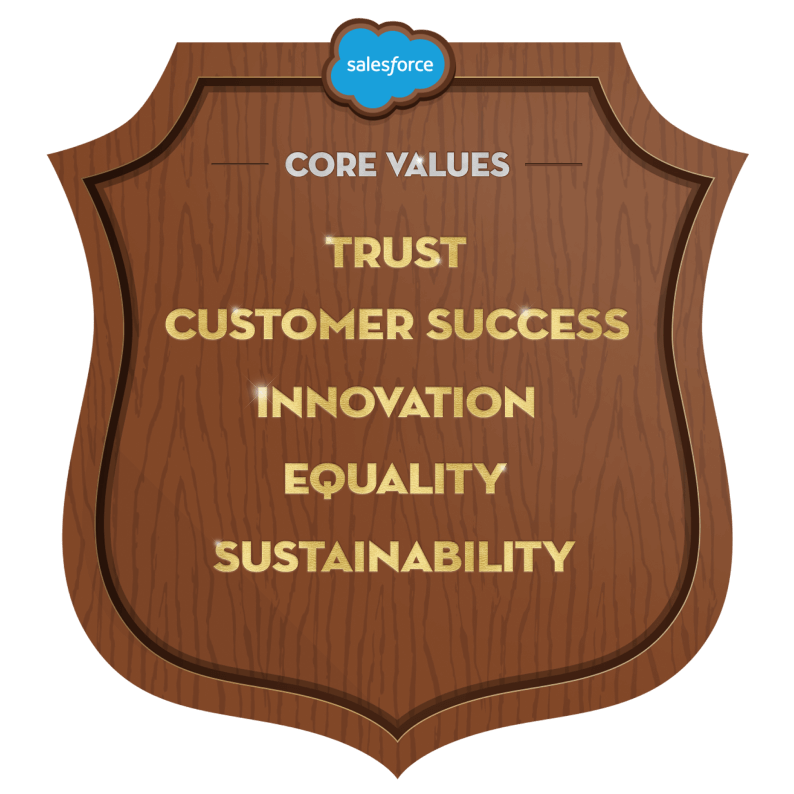Get to Know Salesforce Supplier Sustainability Commitments
Learning Objectives
After completing this unit, you’ll be able to:
- Describe Salesforce’s commitment to supplier sustainability.
- Summarize the sustainability-related expectations Salesforce has for suppliers.
At Salesforce, sustainability is a core company value. Our vision is to leverage the full power of Salesforce to accelerate the world to net zero greenhouse gas (GHG) emissions. We’re committed to using our customer voice and purchasing power to help achieve this vision. By strategically engaging with our suppliers and by elevating sustainability in our purchasing decisions, we can create a cascade of impact in our value chain and accelerate global progress to a net zero, nature positive future.

Salesforce strives to work with business enterprises that share our commitment to deliver a sustainable, equitable, low-carbon future for all. We expect our suppliers to be active and engaged participants regardless of company size and type. Every company has a role to play.
There are four key ways in which we expect suppliers to join us on this shared sustainability journey.
- Set a science-based target to reduce emissions in line with a 1.5°C future and disclose related data annually.
- Provide a third-party sustainability scorecard that reflects your organization’s recent sustainability performance.
- Agree to a Sustainability Exhibit, a set of binding sustainability-related contract provisions, within your contract with Salesforce.
- Demonstrate partnership and transparency by engaging proactively and collaboratively with Salesforce.
Additionally, all suppliers are expected to review our Supplier Sustainability Program Guide and comply with our Supplier Code of Conduct, which outlines our minimum expectations for suppliers on important topics, including protecting the environment, diversity and nondiscrimination, workplace health and safety, human rights and labor, and community involvement.
Learn more about the Supplier Code of Conduct, Science Based Targets, third-party scorecards, and the Sustainability Exhibit in the Resources section below.
Let’s dive into these expectations to help your organization become a successful sustainability partner.
Set a Science-Based Target
Science-based targets (SBTs) are corporate climate goals to reduce greenhouse gas emissions (GHG) in line with what the latest science deems necessary to limit global warming to 1.5°C.
It’s imperative for businesses to act beyond their organization and drive impact across their value chains to limit global warming to 1.5°C. That’s why we ask our suppliers to set SBTs and strive to enable our suppliers’ success in setting and achieving these targets.
Salesforce strongly recommends that our suppliers validate their targets through the Science Based Targets initiative (SBTi) and use SBTi’s target-setting guidance and tools. The SBTi provides specific guidance and a streamlined validation pathway for small and medium-size enterprises (SMEs).
Because suppliers’ SBTs cover their full operations, and not just the emissions related to their business with Salesforce, we’re working together to create a cascade of impact through our supply chain.
Read more about SBTs, the SBTi, and related tools in the Resources section at the end of this unit.
Reduce and Report Emissions
We want to purchase products that support our progress to net zero, and we rely on data from our suppliers to measure and manage that progress. Salesforce may request that our suppliers provide data on the emissions related to the goods and services delivered to Salesforce. We want to see these emissions decrease over time in line with limiting global warming to 1.5°C.
Our suppliers can use the CDP Climate Questionnaire to provide emissions data and climate information to Salesforce annually. We also expect suppliers to publicly disclose their full value chain emissions to help drive supply chain transparency and accountability.
Provide a Sustainability Scorecard
Scorecards produced by third-party rating platforms help Salesforce better evaluate suppliers’ sustainability performance and progress. Salesforce strongly encourages all of our suppliers to complete an annual assessment with a reputable sustainability scorecard provider, such as EcoVadis, and select suppliers may be required to do so. These assessments may be used to inform sourcing decisions and supplier business reviews.
Sustainability scorecards enable Salesforce to:
- Meet corporate sustainability goals and drive impact.
- Evaluate suppliers against consistent, comprehensive criteria.
- Provide suppliers with clear expectations and an actionable assessment.
- Gain transparency into our supply chain and identify risk.
Our suppliers can use their scorecard to benchmark their performance, understand best practices, guide sustainability strategies, and identify improvement opportunities. Suppliers can share their EcoVadis scorecard with other customers, too.
Agree to the Sustainability Exhibit
To further align with suppliers on our commitment to sustainability, we incorporated sustainability requirements into the contracting process via the Sustainability Exhibit. Our suppliers should be prepared to have a Sustainability Exhibit included in their next contract with Salesforce. We also invite suppliers to proactively add a Sustainability Exhibit to an existing agreement via an amendment.
We dive into the Sustainability Exhibit in greater detail in a later unit.
Demonstrate Partnership and Transparency
We expect suppliers to engage with Salesforce in a collaborative, transparent, and proactive way. We also encourage our suppliers to identify opportunities to partner together to drive sustainability and innovation in both our businesses.
Salesforce may request periodically that suppliers update us on the status of their progress against expectations, such as through an annual survey or in conjunction with a business review. This helps us make informed decisions, measure success, plan ahead to meet our own sustainability commitments, and identify opportunities to better support our suppliers on sustainability.
In the next unit, you discover how sustainability is incorporated throughout the procurement process, from supplier selection to contracting and via supplier business reviews while doing business together.
Resources
- Salesforce.com PDF: Global Supplier Code of Conduct
- Salesforce.com PDF: Supplier Sustainability Program Guide
- External Website: SBTi Guide: How to Set a Science-Based Target
- External Website: EcoVadis: How Can You Get the Best Possible Score on Your Assessment?
- External Website: CDP: Disclose Data
- Salesforce.com: Stakeholder Impact Report